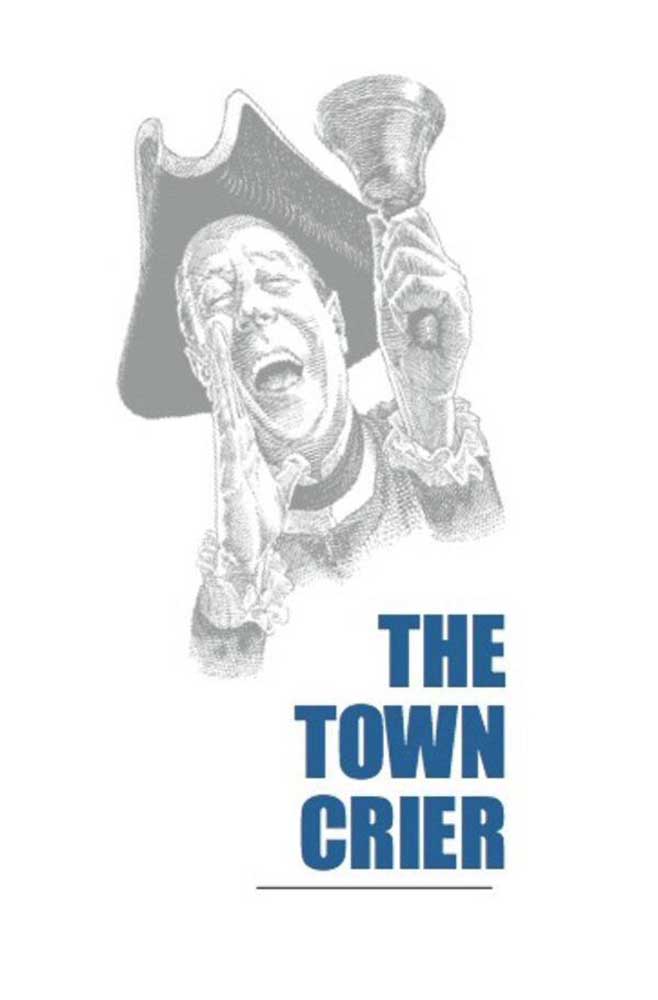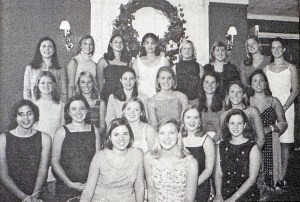The Town Crier: Old jokes
Published 11:00 am Sunday, March 10, 2024

- The Town Crier
Milton Berle, who had a reputation for stealing other comedians’ jokes, supposedly said, “There are no old jokes as long as there are new audiences.”
Old jokes still work as long as the reference is still understood by the modern audience. For example: “Ma, Ma, where’s my Pa? Gone to the White House, ha ha ha!” You can stop scratching your head, this is a joke on Democratic President Grover Cleveland, who had a child out of wedlock and never married the mother. It was both a chant and a joke.
Trending
Not so funny, eh? When was the last time you thought about Grover Cleveland? On the other hand, when it comes to Abraham Lincoln the old joke (and rather dark it is) goes “Other than that, Mrs. Lincoln, how was the play?” Ouch, but also ha ha ha. We still know stuff about Lincoln, including the fateful trip to Ford’s Theater.
”The yolk’s on you!”
Humor has been around since that first pterodactyl egg fell on a caveman’s head and his buddy, Ogg, laughed, pointed and said, “The yolk’s on you!” Going back a century or so we can glean some oldies but goodies (well, certainly oldies) and see what made ‘em laugh in the old days. A couple more examples from the Old Farmer’s Almanac:
“Teacher: When water becomes water, what great change takes place?
“Pupil: The change in price.”
Funny because it’s true. The first time I saw bottled water for sale I thought it was a joke. You could get water almost anywhere from drinking fountains, and even at home it was pretty cheap. When was the last time you had a free drink of water? Maybe if you’ve been to Varnell and gotten the spring water there, or you have a well at your house, but other than that, you pay. and extra if it’s frozen.
Trending
“Mr. Batkins: and little Ned, has he got so he can talk?
“Papa Ned: Well, he can chortle ‘Pa’ and ‘Ma’ and a few baseball terms we’ve taught him.”
Kind of funny if you’re a baseball fan. Feel free to retell the joke for whatever sport you’re into. If your friends know you’re a fan they’ll chortle as well. Of course, there wouldn’t have been any baseball jokes until after the game was invented in the mid- to late 1800s. Was this joke used before that? Maybe, with “baseball” switched to “gladiator games” or “horse racing,” which may be even funnier if you think about it.
“Did the doctor limit your diet in any way?
“No, but his bill did.”
I guarantee you that’s funnier today than it was in 1917. If a joke is funny because there’s some truth to it, then that doctor joke has gotten even more truthful, hence funnier. That joke has legs. It’s traveled through the years but also traveled into “funnier” territory.
Of course, in places where socialized medicine has taken place and instead of paying a bill to the doctor you just pay a higher tax to cover the costs of healthcare, folks might not get that joke, and if so, wouldn’t think it as funny. Relevance is pretty important when it comes to a joke, i.e., how close to home does it hit?
“Teacher: Didn’t do your business contract and legal documents homework again?
“Student: No, sir.
“Teacher: Didn’t you promise to do it last night?
“Student: Yes, sir.
“Teacher: Didn’t I promise to flunk you if you didn’t keep your word?
“Student: Yes, sir. But since I didn’t keep my side of the bargain, I won’t hold you to yours!”
The trickster
That’s the kind of joke about a “trickster,” a wise-guy that plays off the known about the opponent. This goes back to Aesop days and the animal fables. As a matter of fact, animals play this part a lot. This includes everyone from Bugs Bunny to Br’er Rabbit outsmarting Br’er Fox and Br’er Bear (fyi, the Uncle Remus stories were brought to America from enslaved Africans who had told the stories there, changing the animals once they got here to North American animals). Also known as the Wise Guy or the Smart Aleck, the trickster gets a laugh when they outsmart their opponent, coming up with a solution that works in an unexpected way. Bar jokes/challenges are the main source of these stories these days.
Bill was the local athletic champ, smart and good looking. At the bar he was challenged by Will. Will was the local, scrawny wise guy.
“Will: I bet you I can carry something in a wheelbarrow for a full block and you won’t be able to carry it back. Deal?
“Bill: Deal.”
They borrow a wheelbarrow.
“Will: Ok, Bill … get in.”
Jokes travel over distances, and time
Jokes travel. They have to to stay alive. First they have to travel over distances, then they have to travel over time.
There are plenty of jokes and wise cracks that are said on the spur of the moment but that never go further than the ears of the ones sharing a joke. Speaking from experience, there are plenty of jokes like that that are whispered from one ear to another during class at school. With the teacher being the butt of the joke, those jokes might be just as funny as any you’ve heard but are not meant to go beyond the “here and now only” stage.
In ye olden days there were a few plays that might have jokes in them that were shared and kept the joke alive. Shakespeare wrote comedies. Graffiti on the wall in a major city, like the colosseum of Rome, might also keep a yuck alive for a long time and get the gag across to a city full of people. The majority of jokes back then got carried around by travelers, including pilgrims, businessmen (who make up their own joke category) and traveling troupes of actors.
With the advent of first the post offices and then media, jokes traveled fast and furious. You can imagine a jokester typing out a wise crack on the telegraph and all the operators along the line “hearing” it. They could quickly spread it around and through the town. Then when the farmer came in to buy some seeds or whatever he gets the old “Have you heard the latest?” from the dry goods counterman.
Spreading the jokes
Of course, newspapers and other printed items like almanacs, spread the jokes. That’s where I’m getting a lot of these jokes. They date from 1896 to 1922. The 20th century was the birth of modern comedy with movies, radio and TV and a thirst for laughs the comedians couldn’t quench. and now with social media and memes the comedy is down to the seconds in how long it takes to get a laugh.
“Mother: Why didn’t you come the first time I called for you?
“Willie: Because I didn’t hear you until the third time I called you?”
And along those lines:
“Mom, can I get a glass of water?
“It’s middle of the night, go back to sleep.”
A few minutes later.
“Mom, can I get a glass of water?
“It’s middle of the night, go back to sleep.”
A few minutes later.
“Mom, can I get a glass of water?
“If you don’t go back to sleep, I’m going to come in there and spank you!”
After a few minutes.
“Mom, when you come in to spank me, could you bring a glass of water?”
The Dalton paper, among many others, used to run jokes and funny stories here and there throughout the pages to fill out any gaps in the columns, especially at the bottom of pages to make sure everything came out even. They will either put in an actual joke or put in quips said by the likes of presidents (this is an election year!).
Lincoln: “If I was two-faced, would I be wearing this one?”
Andrew Johnson: “Washington, D.C., is 12 square miles bordered by reality.”
Chester A. Arthur: “If it were not for the reporters, I’d tell you the truth.”
Grover Cleveland: “No man yet has been hung for breaking the spirit of the law.”
Herbert Hoover: “Blessed are the young, for they shall inherit the national debt.”
Ronald Reagen (to a college protester): “Make love, not war? By the looks of you, you look like you couldn’t do much of either.”
You’ve got to love hippie jokes, president jokes and Dad jokes, any old jokes. They’re as old as dirt and as corny as Aunt Mabel’s big toe, but still funny!
Mark Hannah, a Dalton native, works in video and film production.





